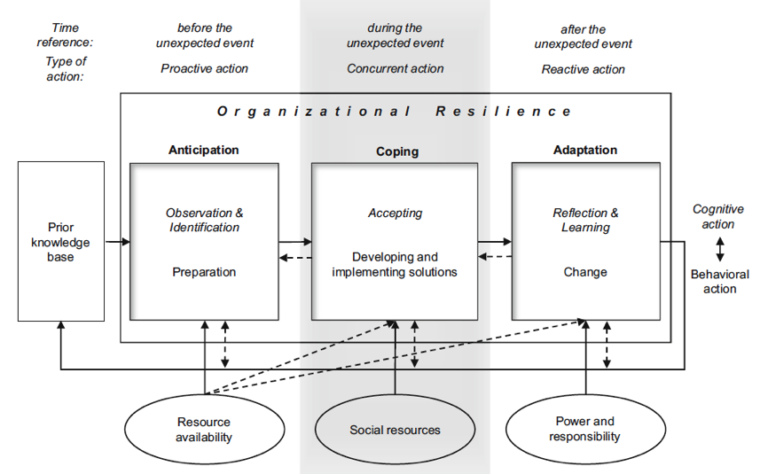Organizational Resilience: The Adaptation Stage
Once an organization has moved beyond the Coping stage, in other words, once it has largely resolved the cause(s) of the crisis and moved the enterprise past the peak danger zone into a prolonged but much less stressful period of recovery, it transitions to a period of Adaptation. This is third stage of Dr. Duchek’s Organizational Resilience model. In this stage, two types of capabilities become important for an enterprise:1) Reflection and Learning, and 2) Organizational Change. Let’s take a look at how each are vital to an organization’s capacity for resilience.
Reflection and Learning
Important cognitive actions that must take place during Adaptation stage of Duchek’s resilience model are Reflection and Learning. These are implied, to some extent, by the use of the term Adaptation to describe the stage. For an organization to become more resilient, it must find ways to help employees grow and develop from their experiences. According to the author:
“To use failure experience for own purposes, both cognition and behavior are essential. On the one hand, organizations must be able to reflect on the crisis situation and to incorporate the gained insight into the existing knowledge base. On the other hand, they must be able to act on this knowledge and produce change.”

These recommendations suggest a few process questions, if organizations are to optimize the value of both reflection and learning following a crisis. What is meant by reflection and learning? What should I be doing to make the most of these practices? How will these be facilitated? Who will perform the facilitation? What should be the focus: Observations? Root causes? Insights? Formalized lessons? How will these be shared once they have been captured? How will they be incorporated into new or revised processes to help the enterprise become more capable – more resilient? These are all great questions – and they are questions that must be solved in unique ways for each organization. To be optimally effective for organizations looking to become more resilient, however, they must be solved.
Reflection. Reflection can be an incredibly powerful process. It’s a process, in fact, that plays a very important role in our ability to learn. To provide some background on the notion of reflection and learning, here are some thoughts shared by Marilyn Daudelin in an article titled Learning from Experience Through Reflection:
“Recent studies have shown that the day-to-day experiences of managers as they confront challenges and problems on the job are rich sources of learning. But managers need support in their efforts to make sense out of their developmental experiences. While reflection is a natural and familiar process that could help managers learn most effectively from their experience, organizations have been slow to embrace formal reflective practices as a way to encourage learning. Henry Mintzburg once wrote in the HBR “study after study has shown that managers work at an unrelenting pace, that their activities are characterized by brevity, variety, and discontinuity, and that they are strongly oriented to action and dislike reflective activities.” More recently, Rosabeth Moss Kanter identified short-term managerial incentives and demands as forces working against managers’ ability to pause and reflect. But recent progress in companies seem to be acknowledging the need to provide time, space, and tools to help their employees reflect more effectively and learn from these reflections.”
Daudelin goes on to describe the process of reflection in this way:
“Reflection is often stimulated by the nagging, unresolved problems or challenges that are a normal part of any manager’s job. Reflection then progresses through four distinct stages: (a) articulation of a problem, (b) analysis of that problem, (c) formulation and testing of a tentative theory to explain the problem, and (d) action (or deciding whether to act).“
Following a crisis, this framework can be particularly useful for high stakes leaders to help employees reflect on their recent experiences. Leaders may also choose to create a mechanism for using these reflections in group settings, as fodder for discussion, and as a starting point for the identification of areas of opportunity for improvement. While we won’t explore these concepts further here, high stakes leaders should know that the process of reflection can be immensely valuable and that it has been formalized in a number of different reference materials that are widely available to support a culture of reflective practice.
Learning. Unfortunately, very little research has been conducted on the various ways that people within organizations have or have not learned from their experiences during a crisis. Case research has been conducted on companies that appear to have learned from experience and on those who have not, with limited insights on why learning did or did not take place. It is generally agreed, however, that learning can take place through both formal and informal processes. Rich reflection, as mentioned previously, can be a source of exceptional individual learning. But this process appears to rarely provide broader benefits without some sort of facilitated sharing and group discussion. Some researchers have found that learning from failures is enhanced considerably by interaction and collaboration among employees and that knowledge sharing between teams and units is a meaningful predictor of perceived ability to learn from failure. While post-crisis learning may not, necessarily, suggest a necessity to ‘learn from failure’, it would be logical to assume sufficient similarities that like practices would produce similar outcomes.
It’s also important for high stakes leaders to understand that the production of lessons and insights does not necessarily translate into organizational learning. Ultimately, learning matters little if the lessons aren’t translated into improved practices and behaviors. Once again, this is where facilitation can become an important factor in the ability of an organization to learn from its experience. Facilitated workshops and working sessions can be exceptional tools in a high stakes leader’s toolkit to help an organization learn from experience and translate those learnings into improved and more resilient practices.
Organizational Change
The process of translating learnings into improved practices fits neatly under the umbrella of organizational change. Change leadership and the process of optimizing organizational change is an incredibly broad and complex topic that is beyond the scope of this course. High stakes leaders need to realize that organizational change is remarkably challenging and will require an incredible amount of time and energy. For our purposes here, crisis leaders should keep the following in mind regarding the contribution of organizational change to a capacity for resilience.
According to the research conducted by Dr. Duchek:
“To produce organizational change, it is particularly important to actually act on previously generated knowledge. Organizations must be able to exploit a newly developed solution and transfer it to their individual parts. To achieve that, change management capabilities are needed. For example, it could be shown that an organization’s change management process is fundamental to organizational resilience. Other scholars point to the importance of a robust strategic planning process with an entrepreneurial focus. In this context, organizations must also be aware that putting new knowledge into practice can create new problems or necessitate further changes. Hence, how change is managed is critical to resilience. As with every other organizational change initiative, change in response to unexpected events may result in different types of resistance. Thus, adaptation involves not only making important changes but also overcoming resistance to change. Resistance to change may be rooted in the individual, team, or organizational levels. To overcome the specific manifestations of resistance, various change management practices can be applied. Soft managerial practices such as effective communication and relationships within the organization seem to be particularly important to enhancing an organization’s resilience. Furthermore, the ability to change can find expression in the successful use of so-called ‘‘change agents’’, which accompany the change and implementation process and, if necessary, have intervention methods and options.”
Once again, given the limited time we have in this course, it is not possible to go any more deeply into change management practices, but there is a good bit of useful material available to high stakes leaders looking to implement a change initiative throughout an organization. One key benefit that crisis leaders will have when attempting to lead such an initiative is that the recent crisis will be fresh in everyone’s mind, making the case for change relatively easy to demonstrate.
The Adaptation stage in Dr. Duchek’s Organizational Resilience model is critical for translating the lessons from a recent crisis into improvements that will allow an enterprise to evolve and benefit from their experience. The lessons produced during this stage will also contribute to improvements in an organization’s Anticipation practices. In almost every case, an effective post-crisis exploration of opportunities for improvement will uncover ways that the enterprise could have or should have “seen this crisis coming”. The next time you have an opportunity lead your team through a process that explores lessons to be learned from a mistake, or a failure, or a crisis, don’t stop at “what did we learn?”. Make sure you pursue potential lessons that would allow you to prevent a similar situation in the future. If you are able to do so, you have contributed demonstrably to improving your organization’s capacity for resilience.
Share this
High Stakes Leadership: Leading in Times of Crisis

High Stakes Leadership: Leading in Times of Crisis


Reach your personal and professional goals
Unlock access to hundreds of expert online courses and degrees from top universities and educators to gain accredited qualifications and professional CV-building certificates.
Join over 18 million learners to launch, switch or build upon your career, all at your own pace, across a wide range of topic areas.
Register to receive updates
-
Create an account to receive our newsletter, course recommendations and promotions.
Register for free







